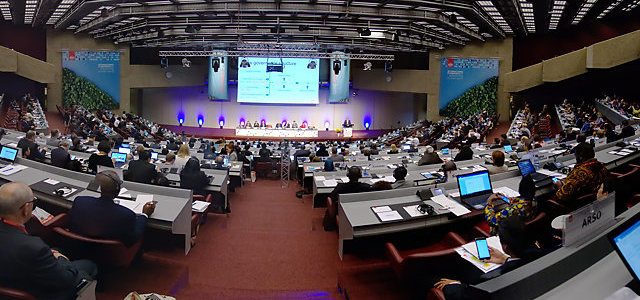Show that you are open and throw away old beliefs and paradigms in order to find solutions that nobody would have been able to find, says Bertrand Piccard, the initiator of Solar Impulse, the first airplane to fly around the world without fuel.
Bertrand Piccard was addressing more than 500 delegates from over 150 countries representing standardization and other international organizations at the 41stISO General Assembly, held in Geneva, Switzerland, last month.
“You have to be interested in what other people are doing, even if it’s not what you think, to create other ways of thinking,” he said, referring to how organizations can innovate and make positive change.

“Advancing the global agenda” was this year’s theme, which looks at how the power of International Standards can be harnessed to address many of the world’s greatest challenges like climate change, pollution, and poverty.
The event comes at a time when “the world needs more ISO”, said ISO President John Walter at the event.
“We don’t build walls, we build bridges. We don’t develop enemies, we develop trusted colleagues. We don’t promote division and isolation from the rest of the world, we create partnerships. And ISO members have a unique opportunity and obligation to show to the rest of the world that we can only address and resolve the challenges that we face by working together – for the benefit of all.”
In his opening remarks, ISO Secretary-General Sergio Mujica highlighted that International Standards provide a platform for innovation, from which new technologies and solutions can be found.
“They are also key tools for addressing all of the challenges outlined in the United Nations Development Agenda 2030 and its 17 Sustainable Development Goals (UN SDGs), a key focus of this year’s event,” he said.
“ISO has been involved with the SDGs even before they were created, and this year’s General Assembly is the perfect starting point for developing a roadmap for policy makers, businesses, and organizations for how International Standards can help us achieve a more sustainable future.”
To this end, ISO held an interactive session jointly with the United Nations, represented by the United Nations Economic Commission for Europe (UNECE), to discuss how regulators, businesses and standardizers can work together to further contribute to the UN SDGs.
ISO has also launched a dedicated page on its Website, with a mapping tool that highlights more than 600 standards that contribute directly to achieving the Goals. It is intended to serve as a valuable resource for organizations looking to play their part.

Other key speakers at the event included Jean-Pierre Reymond, Ambassador of the Permanent Mission of Switzerland to the United Nations Office, Deputy Director-General Alan Wolff of the World Trade Organization (WTO) about how standards help to facilitate international trade, and Filippo Veglio from the World Business Council for Sustainable Development (WBCSD) on how standards contribute to addressing sustainability.
Interactive workshops and discussions also took place about trends in international trade and the role of standards, technology standards and innovation, and engaging policy makers and government.
The annual ISO General Assembly brings together representatives from ISO members around the world. It was part of the ISO Week 2018, a week of meetings held in Geneva, Switzerland, from 24 to 28 September 2018.
This article first appeared on the ISO website and is published here with permission. Please visit the ISO Website www.iso.org for more information.

